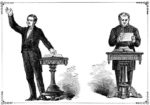SMYK’s Due Tomorrow.
Test #25 will Be NEXT THURSDAY.
“HD, 3/15.” Answer, not letter.
- What is the official name for the FANBOYS?
- A COMPOUND sentence has at least how many subordinate clauses?
- Besides using one of the FANBOYS, what is another way to join independent clauses into a compound sentence?
- The predicate is another name for the main _____ in a sentence or clause.
- She is a savvy basketball player. a) adjective b) not an adjective
- The expression “Ignorance is bliss” is a motto. True or False?
Debrief Test #24. Ugh for everyone except Period 6.
“Agreement, 3/15.” Write the subject and the appropriate form of a verb.
- Here ___ the photographs of the llama.
- Each llama ____ for the camera.
- Where ____ the blonde llamas born?
- “Silly Llama Memories” ____ about back and back and back times.
- Two hours ____ like a long time to a llama.
- The Llama Islands ____ the old name for Hawaii.
- The United States ___ full of llamas.
- The llama squad ____ not agree with the captain.
- According to Emily Dickinson, the majority of people always ____ what is right.
- That herd of llamas ____ in a treehouse.
“Vocab, 3/15.” Each word once. No hints. OK to collaborate.











BOB, p 210 Activities.
“Dark They Were, and Golden-Eyed.” p214-215.
“Why are names so important?” The alternative title of the story was “The Naming of Names”
In 1948, two professors at Harvard University published a study of thirty-three hundred men who had recently graduated, looking at whether their names had any bearing on their academic performance. The men with unusual names, the study found, were more likely to have flunked out or to have exhibited symptoms of psychological neurosis than those with more common names. The Mikes were doing just fine, but the Berriens were having trouble. A rare name, the professors surmised, had a negative psychological effect on its bearer.
Since then, researchers have continued to study the effects of names, and, in the decades after the 1948 study, these findings have been widely reproduced. Some recent research suggests that names can influence choice of profession, where we live, whom we marry, the grades we earn, the stocks we invest in, whether we’re accepted to a school or are hired for a particular job, and the quality of our work in a group setting. Our names can even determine whether we give money to disaster victims: if we share an initial with the name of a hurricane, according to one study, we are far more likely to donate to relief funds after it hits.
From The Week.
Do names matter?
To a remarkable degree, they do. Though we don’t choose them, our names are badges bearing information about our class, education level, and ethnic origin — or at least those of our parents. Scientific studies have shown that the world makes different assumptions about a boy named Tyrone than it does about one named Philip, and while those assumptions are often wrong, they can have a considerable influence on the course of a life. A name can even exert unconscious influence over a person’s own choices. Some scientific researchers contend that there are disproportionately large numbers of dentists named Dennis and lawyers named Lauren, and that it’s not purely an accident that Dr. Douglas Hart of Scarsdale, N.Y., chose cardiology or that the Greathouse family of West Virginia runs a real-estate firm. To some degree, this has always been true: The Romans had the expression nomen est omen, or “name is destiny.”
Has the way we name kids changed?
In this country it has. Most families used to give boys names chosen from a repertoire established within a family over generations, and while that was less true for girls, there was a relatively finite range of acceptable names, largely limited to those of saints. But in recent decades, the number of names in circulation has exploded. In 1912, when the most popular names in America were John and Mary, parents of 80 percent of American babies chose from among the 200 most common names. Today less than half of girls and about 60 percent of boys are accorded a top-200 name. One study found that 30 percent of African-American girls born in California during the 1990s were given names they shared with no one else born in the state in the same year.
What influences those choices?
The simple answer is taste, but taste is a complex thing. Names come into and fall out of fashion much as clothing styles, musical genres, and haircuts do. None of the top five girls’ names from 1912 — Mary, Helen, Dorothy, Margaret, and Ruth — ranked in the top 40 in 2010, when the leaders were Emma, Olivia, Sophia, Isabella, and Ava. The name Wendy surged after the release of the movie and musical Peter Pan in the early 1950s, and Brittany took off in the 1990s with the career of pop star Britney Spears. The popularity of the names Isabella, Jacob, and Cullen in recent years has been linked to characters with those names in Stephenie Meyer’s Twilight series of vampire novels.
A Swedish study compared immigrants who had changed their Slavic, Asian, or African names, such as Kovacevic and Mohammed, to more Swedish-sounding, or neutral, ones, like Lindberg and Johnson. The economists Mahmood Arai and Peter Skogman Thoursie, from Stockholm University, found that this kind of name change substantially improved earnings: the immigrants with new names made an average of twenty-six per cent more than those who chose to keep their names.
Start Reading the Story.